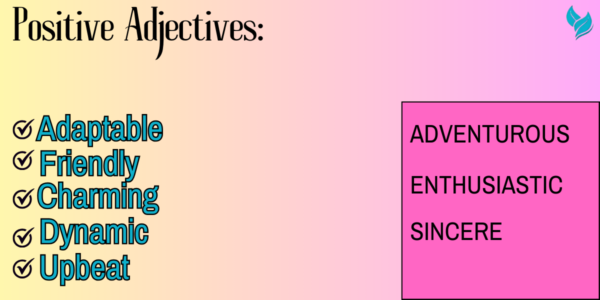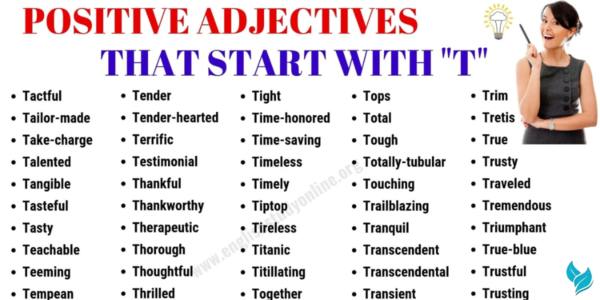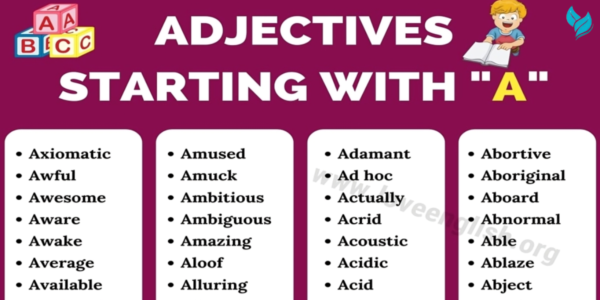In our day-to-day lives, we come across countless people who leave lasting impressions on us. Whether it’s their kindness, intelligence, or charisma, these qualities can be beautifully captured with words. Positive adjectives to describe a person can play a crucial role in conveying the admiration and respect we feel toward others. These adjectives not only uplift the people being described but also help in creating a positive atmosphere. This article will explore different positive adjectives you can use to describe someone in a way that’s meaningful and impactful.
Why Use Positive Adjectives?
The Power of Words
Words have immense power. They can uplift someone’s spirit, foster connections, and create positivity in any situation. Using positive adjectives to describe a person can have a profound impact, as these words often go beyond surface-level praise and acknowledge deeper qualities.
Building Stronger Relationships
When you choose the right words to compliment someone, you help in strengthening relationships, whether at work, in friendships, or in romantic partnerships. Everyone loves to feel appreciated, and using descriptive, meaningful language can make that appreciation even more significant.
List of Positive Adjectives to Describe a Person
Below are some of the most commonly used positive adjectives to describe a person. These words capture different traits that can highlight someone’s character, skills, and emotional intelligence.
Positive Adjectives for Intelligence
- Brilliant – This word is perfect for someone who is exceptionally intelligent and able to think outside the box.
- Insightful – An insightful person is someone who offers deep understanding and valuable perspectives.
- Astute – A person who is astute can understand situations quickly and make sound judgments.
- Analytical – For those who excel at problem-solving and have a sharp eye for details.
The Positive Adjectives for Kindness
- Compassionate – This describes someone who genuinely cares about others and their well-being.
- Empathetic – An empathetic person understands and shares the feelings of others.
- Generous – Someone who freely gives their time, energy, or resources to others.
- Altruistic – A person who selflessly helps others, often putting others’ needs before their own.
Positive Adjectives for Creativity
- Imaginative – Someone who has an active imagination and comes up with original ideas.
- Innovative – This word applies to people who think creatively and bring fresh perspectives.
- Artistic – A person with a strong sense of creativity in visual arts, music, or performance.
- Visionary – Someone who has the ability to imagine the future and plan accordingly.
Best Positive Adjectives for Leadership
- Charismatic – This adjective describes someone who can inspire others through their charm and magnetism.
- Decisive – A person who can make decisions efficiently and with confidence.
- Inspiring – Someone who motivates others to act and achieve their potential.
- Influential – A person whose opinions and actions can affect others in a meaningful way.
Positive The Adjectives for Optimism
- Hopeful – This describes someone who maintains a positive outlook on future outcomes.
- Upbeat – An upbeat person is always cheerful and sees the bright side in situations.
- Optimistic – Someone who expects good things to happen and spreads positivity.
- Cheerful – A person with a consistently happy disposition that lifts others around them.
Positive Adjectives for Resilience
- Strong – This word describes someone who has the mental or emotional strength to overcome adversity.
- Tenacious – A tenacious person is determined and doesn’t give up easily.
- Resilient – Someone who can recover quickly from setbacks and challenges.
- Persistent – A person who continues to strive toward their goals, even when facing obstacles.
How to Use Positive Adjectives in Daily Life
Compliments in Personal Relationships
One of the most effective ways to use positive adjectives to describe a person is through compliments in everyday conversations. Whether you’re appreciating a friend’s loyalty or a family member’s kindness, using specific adjectives makes the praise more meaningful.
For example, instead of saying, “You’re nice,” you could say, “You’re such a compassionate person; your willingness to help others is truly inspiring.” This adds depth to your compliment and helps the person feel genuinely seen and appreciated.
Writing and Communication
In written communication, especially in professional settings, using positive adjectives to describe a person can enhance the tone and make your message stand out. Whether you’re writing a recommendation letter or simply emailing a colleague, including adjectives like “dedicated,” “innovative,” or “reliable” can make a big impact.
Positive Feedback in the Workplace
Positive adjectives are also essential in giving feedback at work. Employees feel more motivated and encouraged when they are acknowledged for specific traits like “dependable,” “hardworking,” or “proactive.” This type of feedback fosters a positive work environment and promotes growth.

FAQs?
1. What are some examples of positive adjectives to describe a person?
Some common positive adjectives to describe a person include brilliant, compassionate, charismatic, and resilient. These adjectives highlight intelligence, kindness, leadership, and strength, respectively.
2. Why is it important to use positive adjectives?
Using positive adjectives helps build stronger relationships, encourages positive behavior, and creates an uplifting atmosphere. Whether in personal or professional settings, these words can boost morale and convey appreciation.
3. How do I choose the right positive adjective?
Choose adjectives based on the person’s specific traits and the context. For example, if someone is great at problem-solving, words like “analytical” or “insightful” would be more fitting than generic praise.
4. Can using positive adjectives improve communication?
Yes, using specific positive adjectives to describe a person makes your compliments and communication more effective. It shows that you are thoughtful and observant, which can lead to more meaningful conversations.
5. Are positive adjectives only useful for compliments?
No, they can also be used in constructive feedback, writing recommendations, and expressing appreciation in formal and informal settings.
Conclusion
Using positive adjectives to describe a person is a simple yet powerful way to acknowledge someone’s unique qualities. Whether you’re giving compliments, writing, or offering feedback, these adjectives help convey a deeper sense of appreciation. So, the next time you want to recognize someone’s strengths, choose words that truly reflect the impact they’ve had on you or others.
By incorporating these positive descriptors into your daily interactions, you’ll not only uplift the people around you but also contribute to a more positive and affirming environment.











